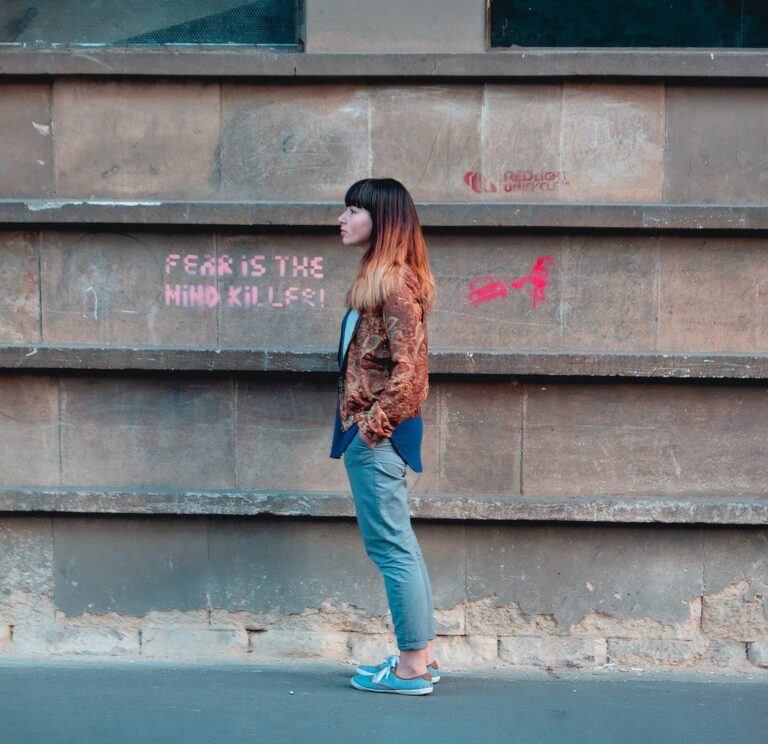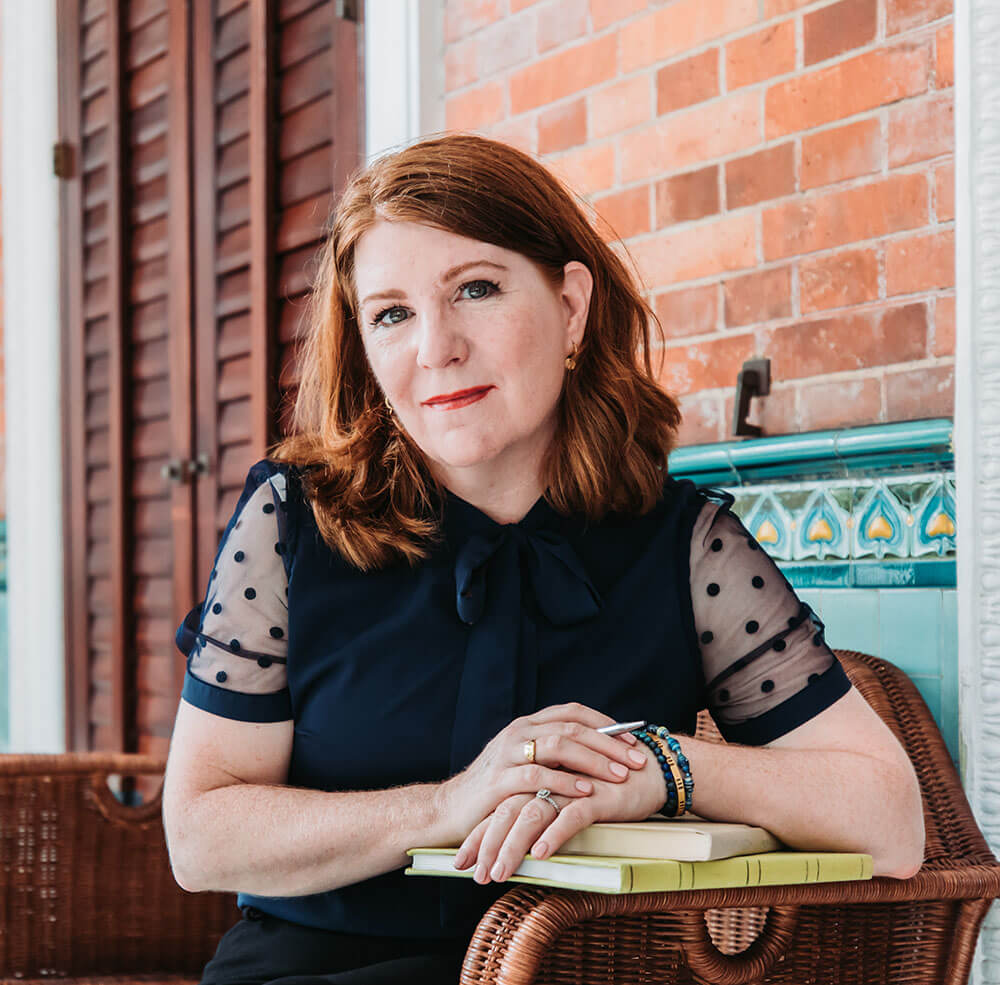We keep ourselves inoffensive, not doing/saying/being what is true so we don’t make people mad or hurt their feelings. Stop.it.
Why do we play small?
Think of the times you pull yourself back in—maybe it’s a comment you don’t make because you ‘don’t want to look like a show-off’ with the information you were going to share. Or you don’t wear that really cute outfit you love because you ‘don’t want to make her feel bad’. Maybe you have a thing you really want to go after—a promotion, a career change, a creative undertaking. And you wrestle with it for a while before giving up by thinking, ‘that’s probably not for me.’
Why do we do this? Fight our initial instinct? Negate an idea to avoid someone else’s response? Decide we won’t try something new unless we can guarantee a specific outcome?
Some of why we do this comes from internal factors (our view of ourselves, our values, our strengths) and some of it comes from how we relate to external factors (how we think we are supposed to act, what we are supposed to do as a woman, a good employee, a good mother or father, a good religious person, etc).
It comes down to how these external and internal factors impact our identity-what we believe about ourselves and how those beliefs shape the way we move through the world.
Succinctly, we tap into a survival strategy.
With the lens of human development on, these strategies can be defined as:
-looking good
-feeling good
-being right (my personal favorite)
-being in control
These develop in all of us during childhood as a means to make sense of the world and “survive” our childhoods (even great childhoods require little humans to find a survival strategy that works for them).
When we are operating from this Adaptive version of ourselves (the self who has figured out how to survive in the world with the least amount of conflict and social censure) instead of our Authentic selves (the true core of who we are), it can create internal dissonance.
It’s uncomfy. It feels angsty. It makes us crabby for no apparent reason. We may feel pretty unexcited about things and just try to keep our heads down and get by. We slide into general malaise or even depression.
The problem is that we are out of alignment.
Off our track.
Trying to fit a square peg in a round hole.
Our life just feels off.
Sometimes this feeling of identity crisis is brought on by factors that change our role: marriage, parenthood, death of a parent, divorce, loss of employment, global pandemics, etc. These kinds of events shift a role we have that has been a large part of our identity.
It is a very normal human experience, this trying to find ourselves. It happens as we develop our sense of self, as children, teens, and young adults. We explore, find our edges, try things on to see what ‘fits’. (If you could see pictures of me in the early 90’s with my punk rock hair, you’d know what I mean.)
For all of us, identity shaping involves cultural expectations of my behavior (ex: as a white female), my parents’ expectations (ex: that I do well in school), my religious upbringing (ex: look good, motivation to be good, what good was) and even my delightful husband (ex: that I was largely in charge of our three children’s day-to-day lives).
And so that is what I did.
I was a good girl who worked hard at school, volunteered in the church nursery, was respectful and obedient to my parents and authority. I thought a lot about how I impacted others at all times and worked hard not to be a bother to anyone. Since I did well in school, I had my choice of colleges.
That was a moment I can still recall; making the Adaptive choice when my Authentic self wanted something different. It was the day I stood in our living room with an acceptance letter in each hand, my list whittled down to my top two colleges. One was out-of-state and would allow me a much more diverse education and life experience and one was a small school about an hour away.
I stood there, secretly wanting to go to the out-of-state school and the unknown adventure ahead of me. My dad withheld his opinion as I talked myself through the pros and cons. But when I flat-out asked him which school I should go to, he said the local school. And my heart broke a little for myself, but instead of pushing through the good girl story and going with my instincts, I decided not to be a bother by choosing a school further away.
I have reflected on that moment a number of times, wondering why I didn’t do what I really wanted to do? I had the power to choose, and my parents would have been okay with it, but I just…buckled to some habit of people-pleasing. To doing the ‘right’ thing for my parents.
Ugh.
I saw life through the survival lens I had of being right or perfect. So, every time I evaluate what’s ‘best’ or the ‘right choice’, I shove it through that lens. It’s not good or bad, it’s just the strategy that served me in childhood.
The problem is when your childhood survival skill no longer serves you and you have to build some new strategies.

Sometimes people don’t ever leave behind that safe, childhood survival strategy. They spend their whole lives trying to make sure they look good to their family and society, and that drives every choice. Or maybe staying safe (feeling good) keeps them in their comfort zone their whole lives. Perhaps minutely controlling themselves and every outcome they can is what got them through childhood as safely as possible.
You can imagine how difficult it might be to let go of a childhood survival strategy to try to figure out a new, unknown way to operate in the world. I mean, if I am not being held to doing the right thing all the time, what else is there—failing?? Doing something *gasp* WRONG??
I didn’t even realize my particular strategy was running me until I recognized that other people—sane, reasonable people, did not have the expectation that there was a perfect (right) choice or way to do things all the time.
It turns out humans are not perfect and never will be.
TBH, I was kinda shocked by this. I had just assumed no one was working as hard as I was to try to be perfect and that there was a world in which I somehow COULD be perfect…
…clearly, I have had a huge moment of enlightenment around what it means to be human.
All this to say, my childhood survival strategy and I were doing JUST FINE, thank you very much, until we weren’t. It became clear that the feelings of stuckness and tension and depression I had was because the future I wanted could not come from a place that was ruled by my fear of ever doing something wrong. I was paralyzed with indecision. I would not bring projects to completion for fear they wouldn’t be good enough.
This was me living a small, safe, meager existence.
And the only way through this stuckness was to start letting my Authentic self take some of the lead.
How could I tell the difference between my Authentic self and my Adaptive self?
Here are some of the distinctions I saw:
1) Fear.
If I was choosing not to do something because I was afraid of it failing, or not being good enough, I knew that was my Adaptive self talking. I asked myself, “What is the worst that could happen? And then what? And then what?” until I could see what the actual fear was and work to get to reality.
Now, being nervous/excited (nervous-cited) about the future and what could be possible was not coming from an Adaptive place of smallness. Sometimes it’s hard to tell these apart at first, but know that the nervousness coming from your Authentic self also has that tinge of excitement and possibility. Fear only sees what could go wrong.
2) Control.
If my plan or my desire included things outside of my control, it could make me really anxious. So I am having to learn to get really clear on what is inside my control (not much aside from myself) and release the rest. Yep, it could all go sideways. People could do things I don’t want them to. There are so many things legitimately outside my control! So, what’s the worst that can happen? And then what? And then what? Can I live with those possibilities? Can I mitigate some of them?
3) Manipulation.
No one likes that word, and I was HORRIFIED when I realized that’s exactly what I had been doing with my people-pleasing—I was trying to control the emotional response of other people. Yeah, so that’s manipulation. *cringe*. It started to become obvious to me when I was doing something to ‘make them feel better’. Or ‘so they aren’t mad/sad/disappointed’. I mean, don’t be an a-hole, but if you are making a choice to not go to the college of your dreams so your parents aren’t sad, well, consider if it’s your Authentic self doing the talking (it’s not—your Authentic self is a really decent human who is aware of what is best for HER and will let the other humans around her take responsibility for their own emotions, thank you very much.)
Playing small comes from a place of survival.
Along the way as we grow up, we are given opportunities to choose to be driven by the things that make us smaller in this world (trying to look good, trying to feel comfortable/safe, striving for perfection/right-ness, controlling the world and people around us). Or the things the call us to braver, stronger, more fulfilled versions of ourselves.
There is no problem if you want to stay in a place of survival mode—look, those strategies have kept you safe for a long time!
It just depends on how loud that dissonance is between where you are as a human and where your Authentic self could take you, if you let it.





